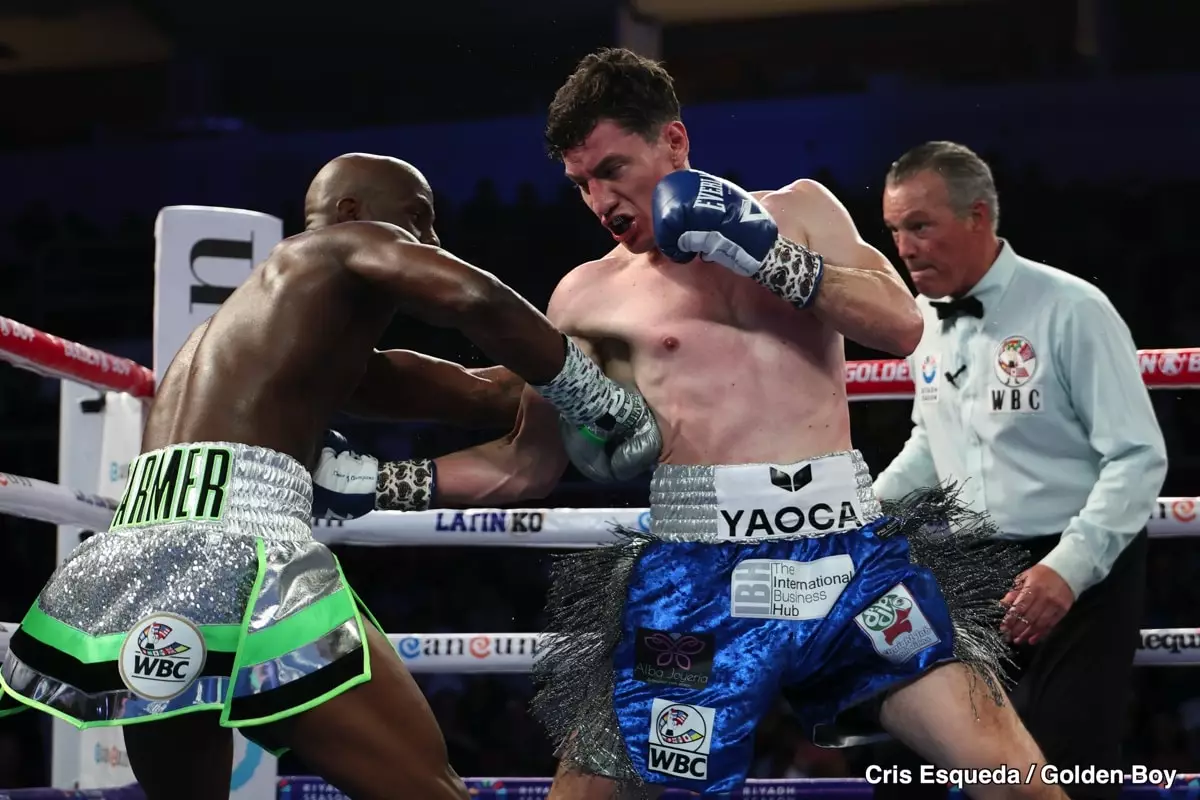In the recent high-stakes rematch between Tevin Farmer and WBC interim lightweight champion William Zepeda, boxing aficionados witnessed a display that underscored a fundamental strategic divide in the sport: aggressive attack versus defensive maneuvering. Farmer, known for his resilience in the ring, entered the bout with a clear game plan, yet opted for a clinching-heavy approach rather than taking the risk of engaging Zepeda with powerful shots. This decision cost him dearly, resulting in a majority decision loss that marks a significant turning point in his career.
Both Farmer (33-8-1, 8 KOs) and Zepeda (33-0, 27 KOs) came into the fight armed with contrasting strengths—Zepeda with his knockout power and Farmer with an established reputation for tactical adaptability. The setting in the Poliforum Benito Juárez in Cancún, a vibrant locale for boxing enthusiasts, set the stage for what was expected to be an exciting clash of styles. However, the fight devolved into a contest marked more by Farmer’s clinching than by effective striking, creating a lackluster spectacle for fans hoping for an explosive encounter.
The Tactics on Display
As the fight progressed, it became increasingly evident that Farmer’s approach—while initially seeming practical—restricted his ability to land significant punches and denied him the momentum needed to secure a victory. Rounds one through eight reflected Farmer’s reliance on clinching as a defense mechanism, wherein he effectively neutralized Zepeda’s offense but at the cost of his own activity. This strategy, while keeping Zepeda at bay, transformed the match into a battle of stamina rather than skill, resulting in a lack of genuine excitement.
Zepeda, on the other hand, utilized his technical prowess, performing admirably despite being frequently tied up in Farmer’s grasp. The Argentine boxer showcased his ability to throw devastating body shots, putting Farmer on the defensive and nearly stopping him in pivotal rounds two and four. While Farmer managed to score occasional hits, they lacked the potency required to shift the fight’s momentum in his favor. In the later rounds, however, Farmer displayed a glimmer of potential when he finally released himself from his clinching strategy, momentarily stunning Zepeda in the twelfth round. It brought to light what could have been had he initiated that offensive earlier in the bout.
A Question of Refereeing
Boxers often find themselves navigating not just their opponents but the officials overseeing their bouts. The referee’s role in the fight raises significant questions regarding regulation and fair play. In an ideal combat scenario, the governing authority should enforce rules that maintain the spirit of competition and encourage active engagement, rather than allowing a fighter’s strategies to overshadow the primary goal of striking efficiently. Farmer’s unabashed clinching drew criticism, as experts noted it could be construed as a form of cheating that undermined Zepeda’s chances.
It’s crucial to consider whether referees have a responsibility to penalize excessive clinching that hinders a dynamic fight. A lack of points deducted from Farmer for his overtly defensive tactics not only affects the integrity of the match but also robs viewers of the skillful, fast-paced action that boxing promises. Critics argue that the governing bodies must take greater measures to ensure that bouts maintain engagement and excite their audiences rather than devolve into a contest of avoidance.
Farmer’s Reaction and Future Prospects
Post-fight, Farmer’s comments painted him as the ‘victim’ of a shoddy judging system, further marred by his clinch-centric tactics that many viewed as an unwillingness to engage meaningfully. This defensive mentality may create a perception that Farmer is more focused on surviving than competing—a notion that could severely hinder his future opportunities. The boxing world demands fighters willing to take risks, yet Farmer’s current trajectory, especially in the context of a potential third fight with Zepeda, suggests that his strategy may limit him to mediocrity on a larger stage.
Zepeda, after effectively overcoming Farmer’s tactics, must now consider moving away from this rivalry and pursue opportunities that match his potential and ambitions. Remaining entrenched in a series of rematches with Farmer can curtail his growth as a fighter. It’s time for Zepeda to seek out new challenges—be it against rising contenders or established figures within the lightweight division. For Farmer, finding a path forward may require a reevaluation of his strategies, encouraging him to embrace the risk-taking that defines championship fighters. In a sport that thrives on exhilarating exchanges, combatants should strive to leave an enduring legacy—something that is increasingly difficult for Farmer given his current approach.


Leave a Reply